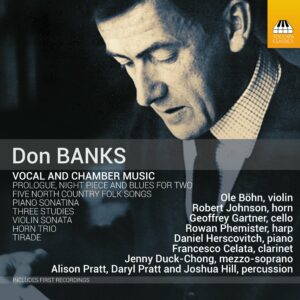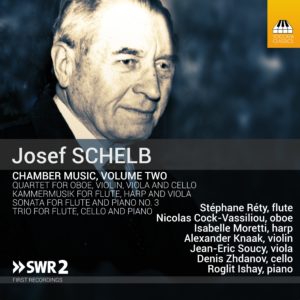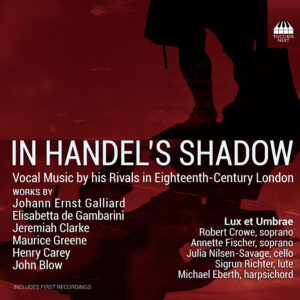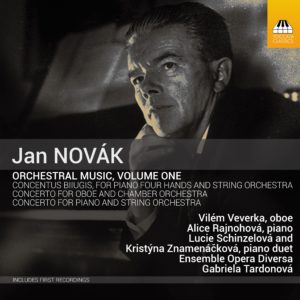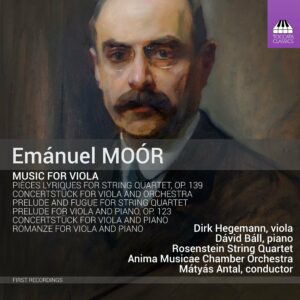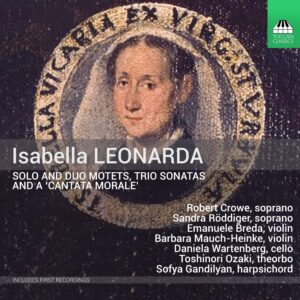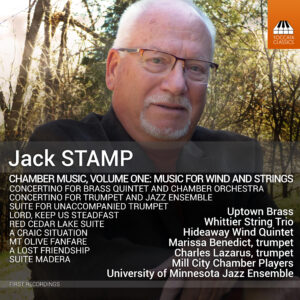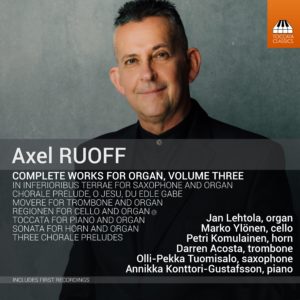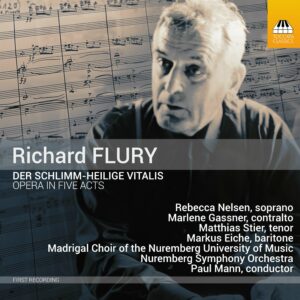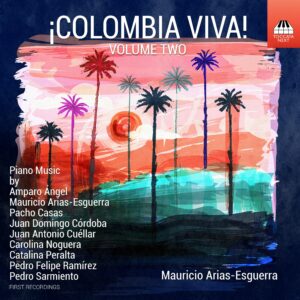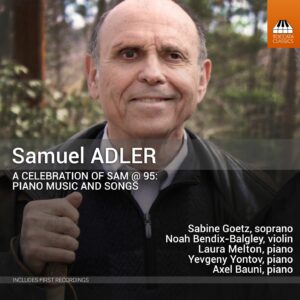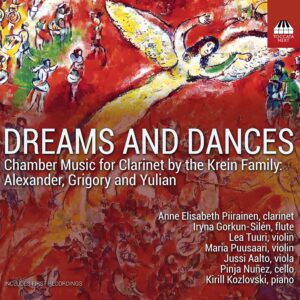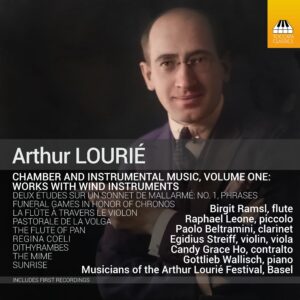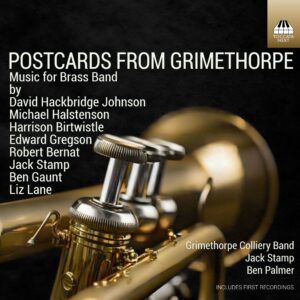Search Results for "Space Wolf: The First Omnibus mp3 torrent"
Don Banks: Vocal and Chamber Music
During his short life Don Banks (1923–80) enjoyed a reputation as the leading modernist among Australian composers. Studies with Mátyás Seiber, Milton Babbitt and, especially, Luigi Dallapiccola helped refine his serial technique, but his music never retreated into academic abstraction, as this recital of chamber and vocal works demonstrates: it retained a keen sense of drama, an ear for atmosphere, a rather angular lyricism and, occasionally, a touch of humour.
Robert Johnson, horn (Tracks 1–3)
Ole Böhn, violin (Tracks 1–3, 18)
Jenny Duck-Chong, mezzo-soprano (Tracks 4–8, 19–21)
Francesco Celata, clarinet (Tracks 9–11)
Geoffrey Gartner, cello (Tracks 12–14)
Rowan Phemister, harp (Tracks 19–21)
David Kim-Boyle, siren (Track 21)
Alison Pratt, Daryl Pratt and Joshua Hill, percussion (Tracks 19–21)
Daniel Herscovitch, piano
Robert Fürstenthal: Complete Choral Music, Volume One
Like many Austrian Jews, Robert Fürstenthal (1920–2016) fled to the USA after the German invasion of his country in 1938. Music then became a link to his homeland: ‘When I compose, I am back in Vienna’. As an amateur composer, Fürstenthal preferred to work on a small scale, and his output of songs and chamber music is considerable. But he also wrote two sizable works for chamber choir, the first of which, in this series of two albums, is bookended by piano sonatas – all three works revealing that the tradition of Schubert and Brahms was alive in the California sun.
Ian Buckle, piano (Tracks 1–4, 16)
Richard Casey, piano (Tracks 5–10, 12–16)
Philippa Hyde, soprano (Tracks 6, 8, 12, 14)
Emma Roberts, contralto (Tracks 6, 7. 9, 12–15)
Rory Carver, tenor (Tracks 5–7, 10, 12, 14, 15)
Felix Kemp, bass (Tracks 5–7, 14)
Borealis (Tracks 5, 6, 8, 10, 13–15)
Skipton Camerata (Tracks 5–8, 10–15)
Stephen Muir, conductor (Tracks 5–15)
Josef Schelb: Chamber Music, Volume Two
The Karlsruhe-based Josef Schelb (1894–1977) is one of the better-kept secrets of twentieth-century German music. His output was substantial: he lost most of his early music in a bombing raid in 1942, but – as if to make up for lost time – wrote some 150 more works after that. In the four chamber works recorded here Schelb’s contrapuntal mastery is given a bucolic twist under the influence of French Impressionism, the two traditions combining to invest these pieces with a freewheeling energy and downright sense of fun.
Stéphane Réty, flute (Tracks 1-9)
Nicolas Cock-Vassiliou, oboe (Tracks 10–12)
Isabelle Moretti, harp (Tracks 1–3)
Alexander Knaak, violin (Tracks 10–12)
Jean-Eric Soucy, viola (Tracks 1–3, 10–12)
Denis Zhdanov, cello (Tracks 7–12)
Roglit Ishay, piano (Tracks 4–9)
In Handel’s Shadow: Vocal Music by his Rivals in 18th-Century London
The figure of George Frideric Handel cast a long shadow over musical London in the first half of the eighteenth century, condemning many of his contemporaries – fine composers themselves – to long years of obscurity. This recording throws light into forgotten corners and discovers some glittering gems, some of them demanding dazzling vocal fireworks from their performers. Several of these composers set scenes from Classical mythology or Old Testament narratives – but they also explore the underside of the Baroque psyche in one of David’s darkest psalms and in a representation of Arcadian madness.
Lux et Umbrae
Robert Crowe, soprano and artistic director
Annette Fischer, soprano
Julia Nilsen-Savage, cello
Sigrun Richter, archlute
Michael Eberth, harpsichord
Jan Novák: Orchestral Music, Volume One
The music of the Moravian composer Jan Novák (1921–84) – a natural successor to Bohuslav Martinů, with whom he briefly studied – is nothing less than life-enhancing: it has Martinů’s rhythmic charge and his unflagging energy. And although Novák had such difficulties with the authorities in Communist Czechoslovakia that he chose to emigrate, there is an infectious optimism, a joie de vivre, in these three works that is instantly communicative.
Alice Rajnohová, piano (Tracks 1–3)
Vilém Veverka, oboe (Tracks 4–6)
Lucie Schinzelová, piano duet – primo (Tracks 7–9)
Kristýna Znamenáčková, piano duet – secondo (Tracks 7-9)
Ensemble Opera Diversa
Gabriela Tardonová, conductor
Emánuel Moór: Music for Viola
The works of Emánuel Moór (1863–1931) ought to be celebrated as among the major achievements of Romantic music, but because of Moór’s peripatetic life – he was born in Hungary, studied in Vienna (with Bruckner), performed in the US and across Europe, became a UK citizen and settled and died in Switzerland – no country has claimed and promoted him to the degree he deserves. Moór’s musical language offers a deeply satisfying blend of contrapuntal mastery and ardent lyricism, as the works on this album – written for or involving the viola – demonstrate. In time he will be recognised as one of the masters of his age.
Dirk Hegemann, viola
Dávid Báll, piano (Tracks 3, 8, 9)
Rosenstein String Quartet (Tracks 1–2, 4–7):
Michael Hsu and SooEun Lee, violins
Dirk Hegemann, viola
Markus Tillier, cello
Anima Musicae Chamber Orchestra (Track 10)
Mátyás Antal, conductor (Track 10)
Isabella Leonarda: Solo and Duo Motets, Trio Sonatas and a ‘Cantata Morale’
Isabella Leonarda (1620–1704) was a remarkable woman. At a time when female composers were a rarity, she was both prominent and prolific. Although she was cloistered (literally: she was a nun) in Novara in northern Italy, the dedications of her published compositions show her to have been extremely well connected. And her music demonstrates that she was well aware of the music of contemporaries like Carissimi and Corelli. These facts would be of merely historical importance, were her music not so engaging: although most of the works recorded here are devotional, they are full of buoyant rhythms, colourful textures and a surprisingly dramatic approach to the texts she was setting – many probably written by Leonarda herself.
Robert Crowe, soprano (Tracks 1, 9, 19, 31)
Sandra Röddiger, soprano (Tracks 9, 10, 24, 31)
Emanuele Breda, violin
Sofya Gandilyan, harpsichord
Barbara Mauch-Heinke, violin
Daniela Wartenberg, cello
Toshinori Ozaki, theorbo
Jack Stamp: Chamber Music, Volume One
The American composer John Stamp (b. 1954) – universally known as ‘Jack’ – is a familiar figure in the worlds of the symphonic wind-band movement that flourishes in US universities and of the brass band on both sides of the Atlantic. This first Toccata Classics album of his music presents a cross- section of recent works for woodwinds, brass and strings, varied in mood, from upbeat to reflective, and in style, from a solemn hymn-setting to buoyant, outdoors Americana à la Copland, now and then coloured by a hint of jazz.
Uptown Brass
Mill City Chamber Players
Hideaway Wind Quintet
Whittier String Trio
Marissa Benedict, Charles Lazarus, trumpets
University of Minnesota Jazz Ensemble
Jack Stamp, Dean Sorenson, conductors
Axel Ruoff: Complete Works for Organ, Volume Three
The organ works of Axel Ruoff, born in Stuttgart in 1957, constitute one of the most important contributions to the literature for the instrument by any composer since Messiaen, with Ruoff often using its unparalleled resources to write music of extraordinary power and dramatic flair. This third volume in Jan Lehtola’s complete recording features the organ in the unusual role of duo partner in chamber music – but it is chamber music conceived on a symphonic scale. Here these five muscular duo works are separated by a series of weighty chorale preludes.
Annikka Konttori-Gustafsson, piano (Track 1)
Marko Ylönen, cello (Track 3)
Olli-Pekka Tuomisalo, saxophone (Track 5)
Petri Komulainen, horn (Tracks 9–11)
Jan Lehtola
organ of Sovituksenkirkko, Hollola, Finland (Track 1)
organ of St Michael’s Church, Turku (Tracks 2, 4, 6, 8–11)
organ of St Paul’s Church, Helsinki (Tracks 3, 5)
Richard Flury: Der schlimm-heilige Vitalis, Opera in Five Acts
Der schlimm-heilige Vitalis (which can be translated roughly as ‘Lustful Brother Vitalis‘) was the last of the four operas by the Swiss composer Richard Flury (1896–1967). It was premiered in 1963, the year after its completion, and then remained unheard until this recording. The plot, based on a novella by Flury’s fellow Swiss, Gottfried Keller, sets jolly village life against religious intolerance and sexual politics in an unsettling blend of the sentimental and the cynical – although love, of course, triumphs in the end. Flury’s late-Romantic music redeems the libretto with a steady flow of memorable melodies, engaging solo and choral numbers, and colourful orchestration – and with a sense of fun never far from the surface.
Rebecca Nelsen, soprano
Marlene Gassner, contralto
Matthias Stier, tenor
Markus Eiche, baritone
Madrigal Choir of the Nuremberg University of Music
Alfons Brandl, chorus-master
Nuremberg Symphony Orchestra
Paul Mann, conductor
¡Colombia Viva! Volume Two
With this second volume of ¡Colombia Viva! – a series capable of infinite expansion, as is indeed intended – Mauricio Arias-Esguerra embarks on another lightning tour of the recent piano music of his native country, displaying the wide variety of styles on offer there, from atmospheric modernism to catchy folk dances, a recurrent element being striking rhythmic vivacity.
Mauricio Arias-Esguerra, piano
Samuel Adler: A Celebration of Sam @ 95: Piano Music and Songs
The youthful agility of Samuel Adler – born in Mannheim in 1928 but long since regarded as the dean of American music – would appear to contradict the fact that he reached his 95th birthday in March 2023. This celebration of his productive life – as composer, teacher, writer and conductor – testifies to his ongoing vigour with a programme of songs and piano works composed, for the large part, after his 90th birthday, many of them tributes to musician friends. His music has its roots in the Neo-Classical clarity of composers like Copland and Hindemith, who were among his teachers, but has a raunchy energy entirely
Adler’s own – and which would be remarkable in a composer half his age.
Sabine Goetz, soprano (Tracks 4, 11, 12, 17-20)
Noah Bendix-Balgley, violin (Tracks 17-20)
Laura Melton, piano (Tracks 1-3, 5-10)
Yevgeny Yontov, piano (Tracks 1-3, 13-16, 21-30)
Axel Bauni, piano (Tracks 4, 11, 12, 17–20)
Dreams and Dances: Chamber Music for the Clarinet by the Krein Family
The Krein family, with its origins in Lithuania, became a musical dynasty of considerable importance in Imperial and then Soviet Russia. The seven sons of its patriarch, Abram Krein, were all musicians, with Alexander and Grigory becoming respected composers, and Grigori’s son, Yulian, adding another generation of Krein compositions. The dances and cantillation of their Jewish background was an important part of their musical make-up, combining at various stages with Russian folk-music, Skryabinesque harmony and French Impressionism. All three shared a predilection for the clarinet, developing a repertoire for the instrument that is only now beginning to be discovered – in what one might call a Krein scene investigation.
Anne Elisabeth Piirainen, clarinet
Iryna Gorkun-Silén, flute (tracks 4–6)
Lea Tuuri, violin (Tracks 1, 2, 9–11, 14–16)
Maria Puusaari, violin (Tracks 1, 2, 9–11)
Jussi Aalto, viola (Tracks 1, 2, 9–11)
Pinja Nuñez, cello (Tracks 1, 2, 9–11, 14–16)
Kirill Kozlovski, piano (Tracks 3–8, 12–16)
Arthur Lourié: Chamber and Instrumental music, Volume One: Works with Wind Instruments
The turbulent life of Arthur Lourié (1891–1966) – student of Glazunov, friend of Blok, lover of Akhmatova, commissar of the Soviet regime, an exile in Germany, France and the USA, ghost-writer for Koussevitzky – is reflected in the wide range of references in his music, from echoes of the ceremonies of ancient Greece to Neo-Baroque and Neo-Classical procedures perhaps inspired by his collaboration with Stravinsky in Paris. Some of the works in this first of two albums surveying his chamber and instrumental music have an almost ritual formality; in others a mischievous grin is not far from the surface.
Birgit Ramsl (flute)
Raphael Leone (piccolo)
Paolo Beltramini (clarinet)
Candy Grace Ho (contralto)
Gottlieb Wallisch (piano)
Egidius Streiff (viola, violin);
Musicians of the Arthur Lourié Festival, Basel:
Lucie Brotbek Prochásková (alto flute)
Hansjürgen Wäldele (oboe)
Nicolas Rihs (bassoon)
Simon Lilly (trumpet)
Nicolas Suter (percussion)
Agnès Mauri (viola)
Mateusz Paweł Kamiński (cello)
Paul Juon: Chamber Music for Viola
Paul Juon was born in Moscow, of Swiss parents, in 1872, studying there with Arensky and Taneyev; Rachmaninov, a fellow student at the Moscow Conservatoire, dubbed him ‘the Russian Brahms’. Woldemar Bargiel, Clara Schumann’s half-brother, was his main teacher at the Hochschule für Musik in Berlin before Juon himself became a member of the staff. There are indeed echoes of Brahms in Juon’s early music but there is also a fondness for Russian folksong and a mastery of counterpoint, which all feed into his urgent, late-Romantic lyricism.
Basil Vendryes, viola
Igor Pikayzen, violin (Tracks 8–18)
William David, piano
Postcards from Grimethorpe: Music for Brass Band
When the American composer Jack Stamp was appointed International Composer-in-Association to the Grimethorpe Colliery Band in 2019, he conceived a recording project focused on works specifically written for the GCB, including compositions by himself and Liz Lane, the other GCB Composer- in-Association, alongside other pieces which have played a prominent role in the Band’s recent activities. The kaleidoscopic range of styles to be heard here displays the extraordinary virtuosity of one of the world’s best-known brass bands.
Grimethorpe Colliery Band
Jack Stamp, conductor
Ben Palmer, guest conductor
Stay In the Know
JOIN THE TOCCATA NEWSLETTER
"*" indicates required fields
By visiting our site, you agree to our privacy policy regarding cookies, tracking statistics, etc.
